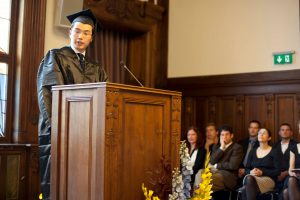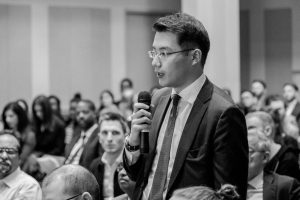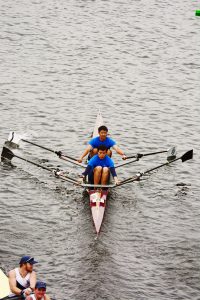
On the BCB campus, it’s not uncommon to find students who switch seamlessly between their three mother tongues. Someone might hesitate before answering the question “Where are you from?” or “Where will you be next year?”
Last month, I sat down in front of my computer to chat with Tuvshinzaya Gantulga, a BCB alumnus who is also always on the move. Born in Ulaanbaatar, Mongolia, Tuvshinzaya was studying economics at the American University in Bulgaria when he decided to come to BCB (then ECLA*) to attend its Academy Year program. Before the year was up, he had decided to stay in Berlin and complete his BA studies at ECLA as part of its first graduating class in 2012. Upon his return to Mongolia, he worked in a grassroots NGO, founded the Mongolian Rowing Association, and headed the American Chamber of Commerce in Mongolia. My webcam caught him in Manhattan, New York, where he had just graduated with a Master of Public Administration degree from Columbia University’s School of International and Public Affairs. Over the course of a few hours we talked about Berlin, rowing, and education: what does a liberal arts education offer to students who are exceptionally mobile, and what can being mobile offer students who are exceptionally curious?
Ronni: What about ECLA caught you when you came for a year of academic study? What compelled you to finish your BA here?
Tuvshinzaya: I think the most important thing was the level of attention I got from the professors. I have been to bigger universities, and you can sort of disappear amidst the hundreds of students, and you have to chase after your professors to get noticed. At ECLA, there was nothing like that – that superficial aspect was eliminated simply because the student-professor ratio was kept very low. That allowed us – the students and the faculty – to engage at a much deeper level, both intellectually and in terms of conversations. That was the most remarkable and the most interesting thing that made me stay at ECLA.
The second thing was: I was trying to study economics and political science before I came to ECLA, and I remember just sitting in the class and thinking “these are interesting, but it’s not really going deep.” What I mean is that, on one hand, you have all these statistical and mathematical proofs, but it’s also a question of why do people really behave like that? What compels them to do that, and what values shape their behavior? None of those questions were answered. What I really loved about ECLA was that we were looking deeply into those questions. We weren’t building any models, like most of the schools do, but we were just really digging deep and trying to understand the foundations. I felt that it was a very rare opportunity. Not many educational institutions would be consistently devoted to that.
And the third reason was the environment. I was within the environment of Berlin, and I remember walking through the Brandenburg Gate, and then going to the German Historical Museum in Unter den Linden where I see illustrations and photos of Napoleon, Zhukov, Montgomery, and even Hitler walking through the same gate. I thought to myself: “Wow, by simply being here I am turning into an extension of this incredibly rich history of the world.” That was fascinating to me. I tried to spend as much time as I could exploring Berlin, and ECLA gave me that opportunity. That was just amazing.
The second part of the environment is the people. Which is funny – I don’t think there were many Germans in the school, maybe one or two in my first year. That was so weird to me, that the Germans would be a minority in their own capital city. I had never perceived that kind of cosmopolitan community as being possible, but at ECLA we achieved that. At ECLA people were incredibly diverse, and they had radically different ways of looking at the world, and I don’t think I’ve experienced that again since. Maybe here, in New York at Columbia, I’m able to see something similar, but ECLA was really unique. It was also just a few of us there: we had to learn to live together, to accept each other, and we had to learn how to navigate our way through all of our various opinions. Here at Columbia you might have a real, deep conversation with someone of a different background, but not regularly – maybe once a month or so. At ECLA it was every evening, basically – or at every class. We were digging deep and questioning each other’s viewpoints.

R: When you came across these different viewpoints, were the boundaries of the conversation constantly transforming? Or were there often set patterns of thought and approach that originated in different people’s backgrounds?
T: I think ECLA attracted two types of students, ideologically: on the one hand, there were very left-wing students, committed to equality and to justice. Some of them were even radically communist. On the other hand, there were dedicated conservative students, who were religious as well as devoted to preserving conservative values – they were very much convinced of the roles of elites in terms of maintaining societal values. In many American institutions, you will often find students who fall in the middle – center right, or center left, or broadly liberal. At ECLA, however, we had the extremes: extreme left, extreme conservatives, sometimes even neo-conservatives. That was very interesting.
Of course, everyone was very much devoted to their way of thinking, and that was good for me, because I was able to try to understand each person’s responses. I was a centrist student who had come from a post-communist country. I had seen the horrors and the problems of communist policies and life, and on the other hand I also went through the nineties in Mongolia, when the drastic transformation from a socialist to a capitalist system occurred. So I know the disadvantages of both extremes. That was why I often found myself in the center, and that was great for me, because I was constantly questioning my viewpoints from both sides. That was the intellectual overlay of ECLA back then.
R: That’s really interesting, because I don’t think that that dichotomy exists today, at all. The school has become more classically Liberal-Arts-Left. For me it would have been interesting to meet someone with an extremely conservative viewpoint.
T: On the other hand, it’s also very frustrating, right? [laughs] It was such a great preparation for everything I did later in life. I know many people who, when confronted with a contradicting opinion, instead of trying to empathize with the person and defend themselves, they just immediately react. I think that I might have ended up like that had I stayed in Mongolia, or gone to any other university, for that matter. But at ECLA it was an everyday preparation and training.
R: For conversation, but also for a kind of empathy.
T: Exactly. I think that’s very crucial. Now, whenever I meet an extremely left-wing student, I can empathize with whatever they’re saying, simply because I had so many great friends who were left-wing and I was able to see where they were coming from and how they formed their arguments. The same goes for conservative students, too. There is something inherently conservative about a liberal arts education (the Great Books program, for example), and I was able to understand where this devoted conservatism comes from – I don’t think many people really understand that very much. Only ECLA was able to give me that ability to empathize with both sides, simply because we were together all the time, having these intense conversations on a daily basis.
R: Your response really ties in with the next question I wanted to tackle, which is your approach to studying. It seems that in each different stop of your life there’s a core value that you adopt. You have an economic background from the first BA program that you chose in the American University of Bulgaria, which pushed you to study liberal arts at ECLA, which in turn pushed you to take a semester abroad in the U.S., where you became interested in competitive rowing. All these components merge together to form a multi-faceted approach to your career and the way that you worked within the American Chamber of Commerce. This was also reflected in your thesis at ECLA, which also applied Western democracy theories to the way Mongolia has adopted them. That’s a very interesting aspect of your life that I think a lot of our students also go through – I think that everyone has a very nomadic lifestyle – geographically, but also educationally. How has that affected you?
T: I think you’ve hit upon something very fundamental there. I never really think in those terms, but when I look back, I do feel something similar. What I’ve realized – like everybody who studies or advocates liberal arts – is that no discipline exists on its own. Even the most technical aspects of a discipline require a holistic approach that only a liberal arts education can give. That’s something that I really try to pick up in any educational institution. At the end of the day, if I’d have studied only business before I came to the American Chamber of Commerce, I would have been completely lost. We could be talking in the morning about supporting an NGO, in the afternoon about what kind of investments make sense, and in the evenings we could be making hardcore financial analyses. What I’m saying is that no matter what you do, you will have to know so many different fields, be very fluid, and see it more as one thing rather than as different disciplines. That’s what liberal arts helps you to realize and adopt.
R: In regards to your personal life – I’m asking this out of curiosity – do you see your involvement with sport and physical fitness as a direct implication of what you’ve been saying? Seeing something as a whole, so that a lifestyle of ongoing education would need to involve its physicality as well?
T: Yes. I mean, to be honest, I’m in no way in excellent shape at the moment. But I think what you said is very true. At ECLA, we were very much devoted to the study of ideas and to intellectual conversation. We didn’t do any kind of physically intensive things. We had a membership for SPOK –
R: [Laughs] we do, too…
T: But you would have been lucky to see someone there once a week. At the Franklin & Marshall College, where I spent my third year of college as an exchange student, I had the opportunity to do varsity-level sports, and it opened up a completely new dimension in my life. I was able to understand (and this is a total cliché) that without an active body, I won’t be able to have an active mind. And vice-versa. I was able to understand that through rowing.

R: Rowing is another interesting part of your story: You left Mongolia as a young student and came back armed with a BA degree from abroad, but also with a love for rowing – which is essentially a sport that doesn’t exist in Mongolia, right?
T: Exactly. The word “rowing” doesn’t even exist in Mongolian.
R: Were there other things in your life that made you come to face-to-face with new facets of your character that weren’t there when you left Mongolia?
T: I think everything I did was completely new. I was constantly incorporating new facets to my Mongolian identity – in a way, I was enriching it. Seminar-style teaching through conversation is not really a Mongolian thing. We don’t like to question what a teacher is saying – not on a systematic level. In that sense, the Western liberal arts tradition was very new for me. Even writing essays: we write them, but they are much more meandering. In Western colleges, essays are about arguments, how to craft them, how to present them in a way that makes sense logically. Being able to accommodate many different viewpoints in writing is something that is new to me, and I had to learn this on a day-to-day basis.
R: Right now, you’re facing another return to Mongolia after time spent in New York. What do you think are the directions you’ll take this time around?
T: I see the undergraduate years as the most formative for a person. Mongolians who study abroad develop different expectations from institutions and interactions during those four years. When they return to Mongolia, they suddenly realize that people don’t really respond to them or engage with them in the way that they were educated in. And the institutions don’t work in the way they’ve come to rely upon in other countries. All of a sudden, they’re in a very shocked state. I think that’s very common in Mongolia, and there are three types of reaction to that – based only my observations, of course. The first type of reaction is one in which people just can’t take it anymore and go back abroad, either to continue their education or to do something else. They just leave. The second group of people try to forget everything they’ve learned and just adapt back to the Mongolian way of thinking. That, to me, feels defeatist. The third group of people learn to navigate both: on the one hand, being able to preserve their expectations from institutions as well as being able to freely interact with Western people, and on the other hand they are able to adapt so that they will be able to work in a local context. I’m striving to become a member of that third group of people.
Mongolians are nomadic people and we are known for our adaptation skills. There is a joke that if a Mongolian goes to Germany they will become punctual in three months. If they go to Japan they will become diligent and courteous in three months. But when they return to Mongolia, they completely forget all of those things in three months. So basically, I see my return to Mongolia as a tight balancing act between all the important values I picked up abroad and the values that make me a Mongolian.
R: As we near the end of our interview, I’ll ask the classic Alumni Interview Question: what is your advice for people who are nearing the end of their liberal arts studies or people who are wondering how to go forward as liberal arts graduates?
T: The most important thing is understanding the advantages of a liberal arts education. What I realized is that many people lack self-confidence because they’ve learned so many different things without having any specialized knowledge. Even though that’s sometimes a disadvantage, it’s often also an advantage – liberal arts students have very broad knowledge, and being aware of that advantage and utilizing it is essential. It’s not a matter of liberal arts students being badly-trained; it’s about the difference in perspective. Recognizing that and having confidence is important.
The second part – and this comes as a slight contradiction to what I said earlier – is that a lot of this intensive liberal arts education may present extra challenges in the first part of a person’s career. I vividly remember this in my case: the first job that I got after graduating from ECLA was a position in a Mongolian NGO, and I remember that everything that I did came to me naturally. I was writing education projects, democracy promotion projects, figuring out their concepts. That is essentially what I had been trained to do at school, which was great. But when it came to budget, I had no fricking idea where I was [laughs]. That was the point at which I wished I had taken an accounting class.
What I’m trying to say, is – even if you do something that’s very far removed from finance, you still need to have a certain understanding of how these mundane things work. How to account your expenses, your taxes – these are essential skills that enable you to do what you really want to do. If you’re a graduating liberal arts student who doesn’t have a clue about accounting, I really urge you to sign up for an online course to figure it out – not to become a professional, just to be able to utilize it in order to advance your career and realize a larger dream.
R: Huh, surprisingly solid advice.
T: Thank you! I actually took a look at BCB’s current course list and I could see some more practical aspects there. Embrace that educational approach, but also acknowledge its limits – that’s the advice I would give to a graduating student.
Author’s note: since this interview was conducted, Tuvshinzaya has returned to Mongolia where he is currently part of the President’s foreign policy team.
*ECLA was the name of the College until November 2013
